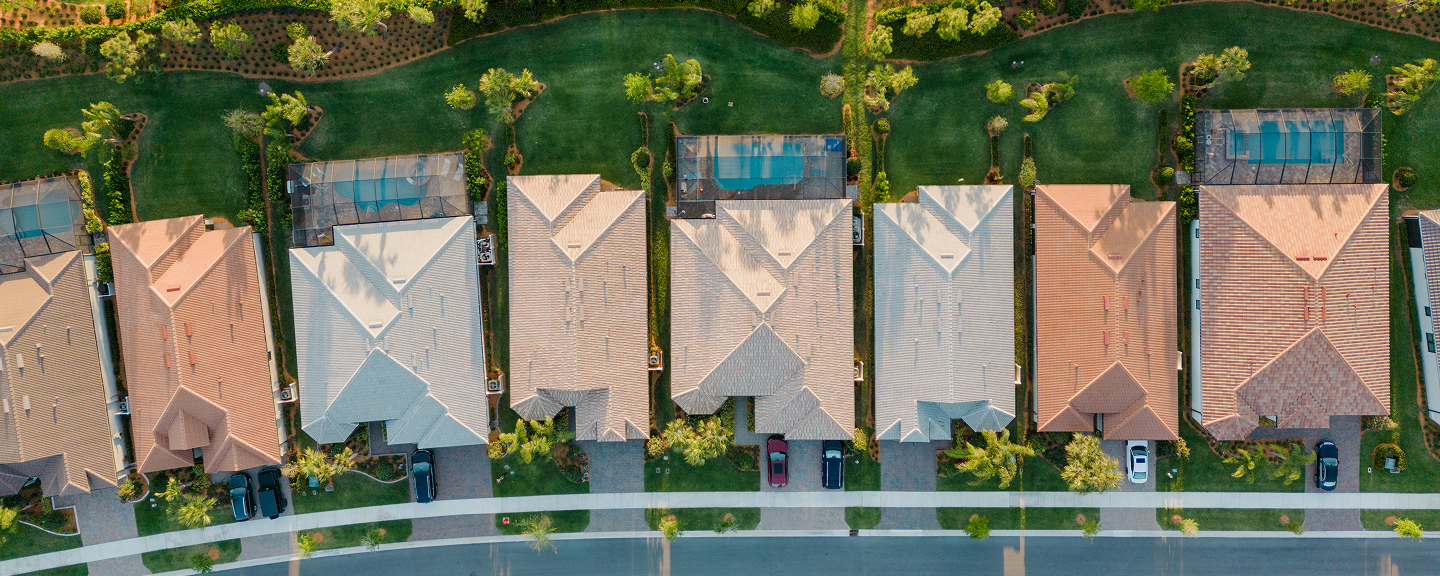What is mortgage refinancing?
Refinancing a mortgage is when you replace your current mortgage with a new one, usually with a new term and interest rate. Refinancing is typically done to help you take advantage of a lower interest rate, reduce mortgage payments, or access the equity you’ve built in your home to fund your goals and big plans.
Why refinance your mortgage?
Tap into your home’s equity footnote 1
Whether you’re planning home renovations, covering unexpected costs, or making a big purchase, refinancing can help fund life's big moments.
Lock in a lower rate
If your current mortgage rate is higher than today's market rates, refinancing could help you take advantage of a lower rate and save over the term of your mortgage.
Manage your debt
Refinancing lets you access up to 80% of your home’s current value, minus what you still owe on your mortgage. This means you can tap into your home equity to clear high-interest debts.
Choose a mortgage option that’s right for you
When you refinance with BMO, you can choose a new term, switch between fixed or variable rates, or convert your mortgage into a Homeowner ReadiLine®: a flexible option that combines a mortgage and a line of credit. footnote 2
Is your mortgage renewal coming up, and you’re unsure whether to renew or refinance? Learn the difference on our Mortgage Renewal vs. Refinance page.

What to consider before refinancing
Before refinancing your mortgage, take time to consider the potential trade-offs:
Refinancing costs: Depending on how you refinance, you may need to cover fees like legal costs, appraisals, mortgage registration, or charges for switching lenders.
Prepayment penalties: If you refinance before the end of your current term, you may be charged a penalty for breaking your mortgage early. It’s important to weigh the costs before moving forward.
You will need to submit an application: This will help prove your financial standing and determine the amount you can borrow.
Is mortgage refinancing right for you? Speak with our mortgage experts to make an informed decision about your next steps.
How to refinance your mortgage
Refinancing is a big decision, but we make it simple. Our mortgage experts will guide you every step of the way.
Determine if refinancing is right for you
Understanding your reasons for refinancing is key. Weigh the benefits and potential trade-offs to ensure the decision aligns with your .
Review your finances
Review your current mortgage term, your income, expenses and debts. Understanding your overall financial picture will help you choose the right refinancing option and ensure you’re in a strong position to qualify.
Explore your refinancing options
Choose a new mortgage term: Choose a new term, switch between a fixed or variable interest rate, and/or change your amortization period.
Convert your mortgage to a BMO Homeowner ReadiLine®: Combine a mortgage with the flexibility of a revolving line of credit. With responsible use and regular payments, you can manage your borrowing as needed. footnote 2
Blended Portable Mortgage or Blend & Extend Portable Mortgage: Both options allow you to borrow additional funds footnote 3 without incurring a prepayment charge. footnote 4 Blended Portable allows you to keep your remaining term, while Blend & Extend allows you to extend your existing term.
Talk to us about your needs
Talk to an expertWhether you’re ready to refinance or you’re still weighing your options, a BMO Mortgage expert is here to support you. We’ll help you understand your financial situation and find the solutions that best support your goals.
Explore our mortgage rates
Finding the right mortgage option starts with securing your ideal rate. Whether you want the security of a fixed rate or the flexibility of a variable rate, we’ve got you covered.
Switch to BMO and lock in a guaranteed rate
Switch to BMOThinking of moving your mortgage to BMO? When you switch you can lock in your rate for up to 130 days, guaranteed.‡
Homeowner ReadiLine® – a mortgage and line of credit in one
This lending option combines a mortgage with the flexibility of a revolving line of credit, so that you can have access to funds whenever you need them. Borrow up to 80% of your home’s value and choose how you want to allocate your borrowing amount between your mortgage and revolving line of credit portion.
Helpful refinancing resources
Frequently asked questions
Renewing your mortgage means continuing your current loan with a new term, usually when your existing term ends. On the other hand, refinancing involves replacing your existing mortgage with a new one, often to get a better rate, change the loan amount, or tap into home equity.
Learn more about renewing your mortgage and the difference between renewing and refinancing.
As you pay off your mortgage, you build equity in your home. Equity is the difference between the current market value of your home and the amount you still owe on your mortgage.
To calculate your equity:
- Find out how much your home is worth in the current market (not how much you originally paid)
- Find your mortgage balance (how much you still owe)
- Subtract your mortgage balance from your home’s current value
Refinancing lets you borrow up to 80% of that value minus how much you still owe on your property. For example, if your house is now worth $300,000, you can borrow up to $240,000 (80% of your home’s value).
The ideal time to refinance depends on your unique financial situation. Many homeowners choose to refinance when interest rates drop, their credit score improves, or they need to access home equity.
In general, it’s best to refinance your mortgage near the end of your term. However, you can refinance at any time. Just keep in mind that refinancing before the end of your term may come with a prepayment penalty, although the long-term savings could still make it worthwhile.
The cost of refinancing your mortgage depends on a few different factors. Here are some common fees to consider:
Prepayment penalty: If you refinance before the end of your loan term, you may face a penalty. The cost will vary depending on your lender and loan agreement.
Discharge fee: Switching lenders can result in a mortgage discharge fee. This fee is paid to your previous lender and is typically around $400 depending on the lender and the province.
Mortgage registration fee: When you re-register with your new refinanced mortgage, you’ll need to pay a standard fee. The exact cost will depend on your province or territory.
Legal fees: These fees are charged by your lawyer and can add up to as much as $1,000.
Appraisal fees: Lenders may require a property valuation to determine its current value, usually costing around $300.
Refinancing a mortgage typically takes two to four weeks, but it may take longer depending on each step. Your property valuation, for example, can take longer since this step involves scheduling and completing the valuation. To help the process go as smoothly as possible, make sure that you have all your application information handy and understand the steps involved in refinancing your mortgage. You can always speak to a BMO mortgage expert to help walk you through the process and answer any questions you may have.
- Footnote 1 details Subject to BMO’s standard lending criteria. Additional costs, such as appraisal and legal fee may apply.
- Footnote 2 details You can allocate the amount you borrow between a mortgage portion and a line of credit portion. The amount you allocate to your line of credit portion cannot exceed 65% of the value of the property. Any amount you borrow in excess of 65% of the value of your property must be in an amortizing installment. The combined mortgage and line of credit balance cannot exceed 80% of your property's value. The Homeowner ReadiLine® must be registered in first priority on title to your property.
- Footnote 3 details The rate on the additional funds you borrow is a combination of your existing and current mortgage rates.
- Footnote 4 details Subject to meeting BMO’s usual lending criteria. Appraisal and other fees may apply. Please consult your lending agreement(s).




